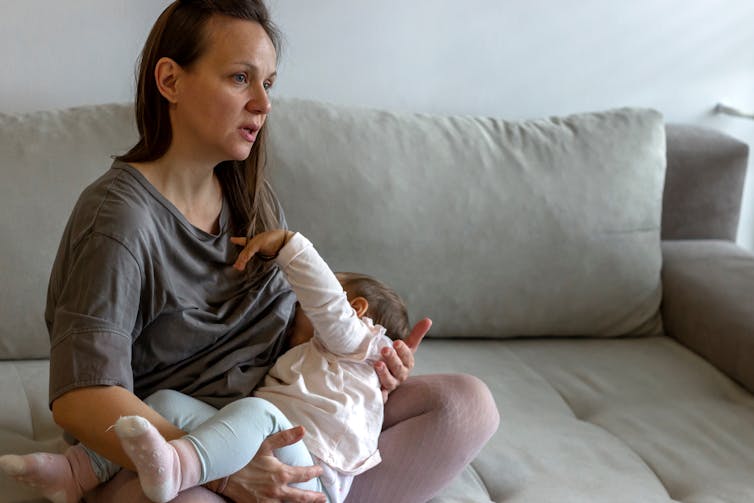
The benefits of breastfeeding are well known – but the UK has one of the lowest breastfeeding rates in the world. The WHO recommends that babies should be exclusively breastfed up to the age of six months (when they can start having food in addition to breast milk). But just 1% of women in the UK exclusively breastfeed their babies to six months old.
There are many reasons that lead mothers to stop breastfeeding, or not start at all. One of these is body image: their perceptions or feelings about their body.
In 2019, one of us (Alison Owen) carried out a review of research studies looking at the relationship between body image and breastfeeding. In total, 13,046 people took part in these studies.
We found that pregnant women with higher body image – those who were more satisfied with the way they looked – were more likely to exclusively breastfeed. Women with concerns about their appearance were less likely to plan to breastfeed. Those who did start breastfeeding carried on for a shorter time than the women who felt good about the way they looked.

This article is part of Quarter Life, a series about issues affecting those of us in our twenties and thirties. From the challenges of beginning a career and taking care of our mental health, to the excitement of starting a family, adopting a pet or just making friends as an adult. The articles in this series explore the questions and bring answers as we navigate this turbulent period of life.
You may be interested in:
Baby names: why we all choose the same ones
What is ‘normal’ baby sleep? How evolutionary clues, not cultural expectations, can help new parents
Men’s fertility also declines with age — here’s what to know if you’re planning to wait to have kids
In a recent study, we explored the body image experiences of breastfeeding mothers in the UK, to try and find out a bit more about how breastfeeding had an impact on how they felt about their bodies – as well as how body image might have affected their experience of breastfeeding.
Awareness of bodies
We interviewed 18 women who had all breastfed their babies and asked them about their thoughts and feelings around their body image, specifically in relation to their breastfeeding.
Although our previous research found that the choice to breastfeed was linked with higher body image, we discovered that considerations, thoughts and worries about how they looked remained a significant part of their experience.

Breastfeeding is a physical experience and it can require mothers to use their bodies in a way that may draw attention. For one of the women we spoke to, body image concerns shaped her experience of breastfeeding by affecting her choices of places to feed her baby. She said:
I don’t have the most positive body image and I think I’ve definitely avoided breastfeeding in public as much as possible, to the point where, apart from flying, I don’t think we’ve ever really breastfed in public.
The choice to breastfeed also means looking different – down to the need to choose different clothes. Women told us how clothes that are suitable for breastfeeding didn’t always help in terms of body positivity. Clothes were a big part of the women’s body image and identity, helping them feel like they were getting back to their “old selves” after pregnancy and breastfeeding, rather than seeing themselves as just “mums”. One said:
I’ve gone back to my own style. I wore breastfeeding clothes for a bit, but I just found that they weren’t very stylish and the ones that were stylish you’d have to pay like £60 pound for a hoodie … or a jumper. So I just thought forget that.
For one of the mothers we spoke to, considerations of how her body looked was a key factor leading her to make the choice to breastfeed. She said:
Everything that I read was always like, you’ll go back to your pre-pregnancy body quicker if you breastfeed… So, I thought oh OK, then ‘cause I thought I’d be like the size of a house after having [baby] so I thought I better breastfeed then … I think that had a big part in me choosing to breastfeed so I could lose the weight.
But some of the women we spoke to also talked about negative feelings about how breastfeeding had affected their bodies, and in particular their breasts. Although she referred to breastfeeding as “one of the best things I did”, one of the mothers said that she didn’t now like to see her breasts. Another said that “it took me a long time to kind of like the deflated boobs, but I just thought well, they’ve served the purpose”.
Bodies as tools
This awareness of the functionality of their bodies – serving a purpose – helped women feel more positive about them. They felt proud of what they had achieved through breastfeeding. One said she had “a deeper level of respect” for her body, whereas before having babies “it was quite superficial”, how the thought of a “muffin top” hanging over her jeans “mattered”. She added:
…In reality it’s like no. Actually, you’ve grown a human and given birth to one and are keeping one alive now with just your body, like it’s amazing.
But this functionality can have a negative side – the sense that the purpose of a mother’s body is just for motherhood. As one mother said:
Your world gets taken over by baby and you become mum and that is your sole purpose … ’cause all you do is just constantly breastfeeding, and I felt like that was all I was.
Other research surveying mothers who chose not to breastfeed found one of the reasons was wanting to feel that their bodies were their own again.
Breastfeeding did affect the body image of the women we spoke to – and the way some of the women felt about their bodies affected their breastfeeding choices, such as choosing not to breastfeed in public.
This is further evidence of the importance of breastfeeding support that helps mothers feel as comfortable as possible about their bodies, even if they do look and feel different to how they did before they had a baby.
Para penulis tidak bekerja, menjadi konsultan, memiliki saham atau menerima dana dari perusahaan atau organisasi mana pun yang akan mengambil untung dari artikel ini, dan telah mengungkapkan bahwa ia tidak memiliki afiliasi di luar afiliasi akademis yang telah disebut di atas.
This article was originally published on The Conversation. Read the original article.







